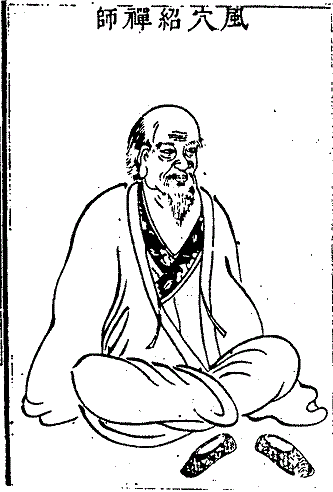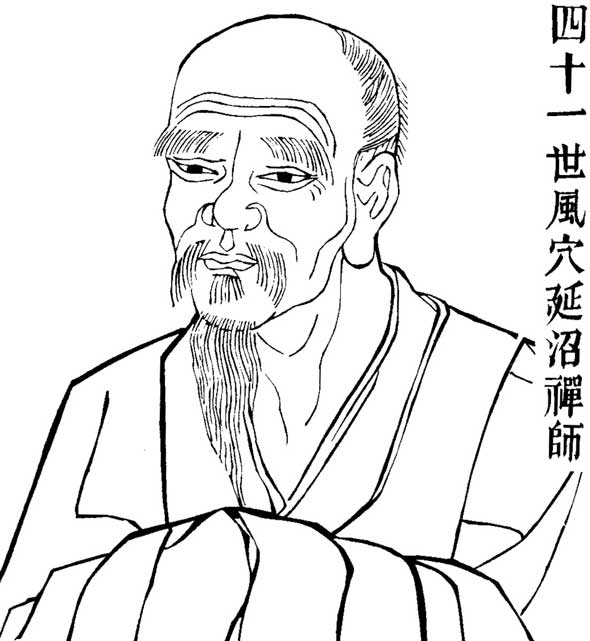ZEN IRODALOM ZEN LITERATURE
« Zen főoldal
« vissza a Terebess Online nyitólapjára

風穴延沼 Fengxue Yanzhao (896-973)
(Rōmaji:) Fuketsu Enshō
Fengxue Yanzhao's Dharma Lineage
[...]
菩提達磨 Bodhidharma, Putidamo (Bodaidaruma ?-532/5)
大祖慧可 Dazu Huike (Taiso Eka 487-593)
鑑智僧璨 Jianzhi Sengcan (Kanchi Sōsan ?-606)
大毉道信 Dayi Daoxin (Daii Dōshin 580-651)
大滿弘忍 Daman Hongren (Daiman Kōnin 601-674)
大鑑慧能 Dajian Huineng (Daikan Enō 638-713)
南嶽懷讓 Nanyue Huairang (Nangaku Ejō 677-744)
馬祖道一 Mazu Daoyi (Baso Dōitsu 709-788)
百丈懷海 Baizhang Huaihai (Hyakujō Ekai 750-814)
黃蘗希運 Huangbo Xiyun (Ōbaku Kiun ?-850)
臨濟義玄 Linji Yixuan (Rinzai Gigen ?-866)
興化存獎 Xinghua Cunjiang (Kōke Zonshō 830-888)
南院慧顒 Nanyuan Huiyong (Nan'in Egyō ?-952)
風穴延沼 Fengxue Yanzhao (Fuketsu Enshō 896-973)

Fengxue Yanzhao
by Andy Ferguson
In: Zen's Chinese Heritage: The Masters and Their Teachings, Wisdom Publications, 2011, pp. 313-315.
FENGXUE YANZHAO (896–973) was a disciple of Nanyuan Huiyong. He transmitted the Linji Zen lineage to future generations. Fengxue came from ancient Yuzhou. He studied Confucianism as a youth and failed on his first attempt to pass the state civil exams. In disappointment, he left home and entered the Kaiyuan Monastery, where he received ordination under the Vinaya master Zhigong. He delved into the Lotus Sutra and practiced the zhiguan style of self-cultivation used in the Tiantai school. Fengxue traveled to broaden his understanding and studies. At the age of twenty-five, he studied with Zen master Jingqing Daofu. Still unsuccessful at uncovering the root of Zen, he continued his travels, and eventually studied under the rigorous Zen master Nanyuan Huiyong. He remained with Nanyuan for six years, finally awakening to the Way and becoming his teacher’s Dharma heir.In 931, Fengxue traveled to Ruzhou, where he began teaching at the already old and dilapidated Fengxue Temple. There he derived his mountain name. News of Fengxue’s ability spread, and before long Zen students gathered around him. The temple’s poor physical condition was beyond repair, however, and in the year 951 Fengxue and his students moved to the newly built Guanghui Temple. Fengxue remained there as abbot for twenty-two years.
*
Upon first meeting Nanyuan, Fengxue did not bow. Nanyuan said, “Entering the gate, one must distinguish who is the host.”
Fengxue said, “To start with, I invite the master to do so.”
Nanyuan slapped his own knee with his left hand.
Fengxue shouted.
Nanyuan slapped his knee with his right hand.
Fengxue shouted again.
Nanyuan said, “Leaving aside slapping the left hand, what about slapping the right hand?”
Fengxue said, “Blind.”
Nanyuan picked up his staff.
Fengxue said, “Don’t blindly strike people or I’ll grab that staff and beat you. Don’t say I didn’t warn you.”
Nanyuan threw down the staff and said, “Today I’ve been fooled by a yellow-faced child from Zhe who’s come to the gate.”
Fengxue said, “It’s as though the master, unable to hold up his begging bowl, pretends to not be hungry.”
Nanyuan said, “Have you been here before?”
Fengxue said, “How can you say that?”
Nanyuan said, “I’m just kindly asking.”
Fengxue said, “I won’t let it pass.”
Fengxue then went out and into the hall. Then he turned around, came back, and bowed to Nanyuan.
Nanyuan said, “Who did you see before you came here?”
Fengxue said, “I spent the summer with your attendant Kuo at Huayan Temple in Xiangzhou.”
Nanyuan said, “You truly saw an adept.”
*
Nanyuan asked Fengxue, “What’s your opinion about the ‘staff of the South’ [Linji Zen]?”
Fengxue said, “I say it’s quite unusual.”
Fengxue then asked Nanyuan, “What does the master say about the staff in this place?”
Nanyuan picked up his staff and said, “Those unable to endure the staff will not see Linji as their teacher.”
At these words Fengxue deeply realized the great meaning of the Linji house.
*
Once, when he addressed the monks, Fengxue cited an ancient who said, “I have an arrow. I have sharpened it for many ages. When I shoot it flies through the ten directions. No one can see where it falls to earth.”
Then Fengxue said, “But as for me, I don’t go along with this. I have an arrow that has never been sharpened. It doesn’t shoot through the ten directions. But still, no one can see it.”
A monk then asked, “What is the master’s arrow?”
Fengxue pretended to shoot the monk with a bow and arrow.
The monk bowed.
Fengxue yelled, “Drag this dead fellow out of here!”
*
Fengxue said to the monks, “Establish one mote of dust and the nation flourishes. The villagers knit their brows in anxiety. Not establishing one mote of dust and the nation is lost. Then the hundred households live in peace. When you understand this, then there is nothing more, and everything is your teacher. If this is not understood, then your teacher is a priest. This teacher and priest can together enlighten the entire world, or blind the entire world. Do you want to know who the priest is?”
Fengxue then slapped his right side and said, “He’s right here.”
Then Fengxue said, “Do you want to know the teacher?”
Fengxue then slapped his left side and said, “He’s right here.”
*
A monk asked, “The ancient song has no tune. How can one be in harmony with it?”
Fengxue said, “The wooden cock crows at night. The matted dog barks in the daylight.”
*
In the hall, Fengxue quoted a poem by Hanshan to the monks:
The Brahmin transmigrates through life and death,
His soul always suffering decay and old age.
Even reading a hundred imperial books,
He can’t avoid beatings and chains.
But uttering Namufo even once,
And all together attain the Buddha Way.